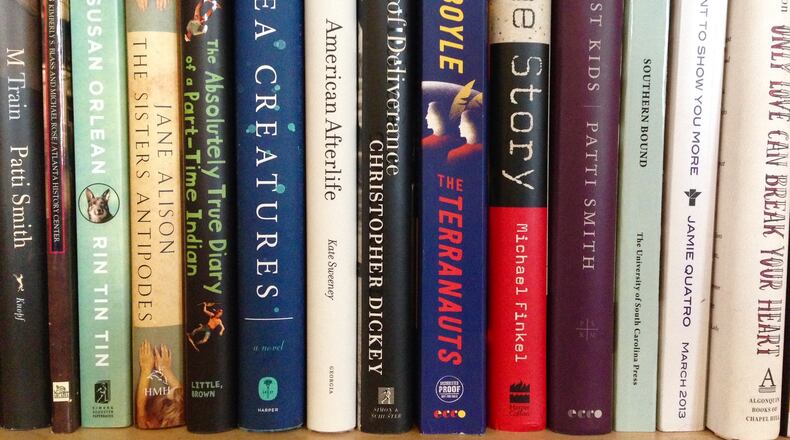In Jamie Quatro's debut novel "Fire Sermon," Maggie sleeps with Thomas during her freshman year in college. In the eyes of her Christian God, she has committed a grave sin, and in her mind, this shameful fornication leaves her with few options. "I have made my bed and now will lie in it, she prays. This man will be my husband … Only let him be a good husband, she prays."
Years later, when she’s a married mother of two young children, and cheating on Thomas with a Princeton professor named James Abbott (an even graver sin), she’ll look back on the night she lost her virginity and wonder why she was ever so hard on herself.
The affair starts out innocently enough. Maggie, a doctoral student in theology and poetry at Vanderbilt University, first reaches out to James over email to gush over his poetry collection. “The poetry unlocked something for me,” she writes. “Cleansed my perception, somehow.”
This begins their feverish, cerebral correspondence infused with art, music and philosophy. Having recently begun pursuing a more creative life, Maggie sends James some of her poems, which he graciously critiques. They gradually share details of their personal lives. Formal courtesies soon yield to intimacy.
If God can be found in uncanny coincidences, in a meeting of the minds, then surely their relationship is some kind of spiritual reckoning. “Both of us 45, born in the same year, four months apart; both married to our spouses for 23 years. Two similarities in what had come to seem, in the three years we’d known one another, a cosmically ordained accumulation: born and raised in the desert Southwest, allergic to peanuts, students of the Christian mystics and quantum theory and ‘Moby Dick.’”
They meet in person for the first time the following year at a conference in Nashville, again two years later in New York, and eight months after that at another conference in Chicago, where they finally consummate their relationship. Despite the ease with which she gives herself completely to James, Maggie’s guilt over the affair is all consuming. “The safe way to let yourself fall in love with someone who isn’t your spouse: imagine the life you might have together after both your spouses have passed away.”
But she’s more concerned about offending her maker than her husband. In a letter to God, she writes: “It’s been a month now and asking your forgiveness would mean seeing that night as sinful, but to preserve the memory I cannot let myself see it that way. Yes this is what you demand of me. To call the memories scales, let them fall from my eyes so I will see the evil behind the pleasure — using the pleasure to draw me away from you.”
Quatro's first book, the evocative short story collection "I Want to Show You More," explored similar themes of sex, spirituality, betrayal and guilt, and like the collection, her prose in "Fire Sermon" is symphonic, erotic. Nimble passages paint vivid pictures of a woman filled with a longing for a life she feels she can never have, and elucidate how Maggie's sanctuary, her religion, gives way to shaky ground.
Yet Maggie is a frustratingly passive character who lacks agency. Her primary modus operandi is inaction. After the tryst in Chicago, she pens several letters to James, but never mails them. “Another journal entry, another letter I’ll never send. Like praying into the void. God of God, Light of Light, Very Void of Very Void.” She’s deliberately obtuse during therapy. She shrugs off her husband’s bizarre and violent behavior, blaming it on “abandonment issues” stemming from his childhood. Not even her frequent musings on mysticism and literature — the writings of C.S. Lewis, Fanny Howe or Meister Eckhart — inspire her enough to escape her indolence. She comes across as more vapid than ethereal.
Unlike Jenny Offill’s incomparable “Dept. of Speculation,” another very short novel that acutely explores the emotional depths of an extra-marital affair, “Fire Storm,” leaves us wanting. Brief excerpts of dialogue with Maggie’s therapist allude to but don’t fully exhume her other transgressions. Two odd asides reveal other relatives’ regret and heartache over lost loves. Is this legacy responsible for Maggie’s own stagnation? Are we meant to believe her inertia can be blamed on an inheritance? Curious details about her past, about her daughter’s mental health, hint at but don’t deliver a more concrete Maggie. As a character, she spins her wheels and never quite takes off.
Still, the lyrical writing may very well redeem its shortcomings, and Quatro’s trenchant introspection on faith, particularly as it falters, is stirring. “The Christian idea of afterlife in which we all still exist as individuals, but together, as a body … I mean, it sounds nice,” says Maggie. “It sounds like a child telling her mother she’s got friends in heaven.”
FICTION
‘Fire Sermon’
By Jamie Quatro
Grove Press
224 pages, $24
Novel explores the emotional, spiritual aspects of infidelity
About the Author
Keep Reading
The Latest
Featured


